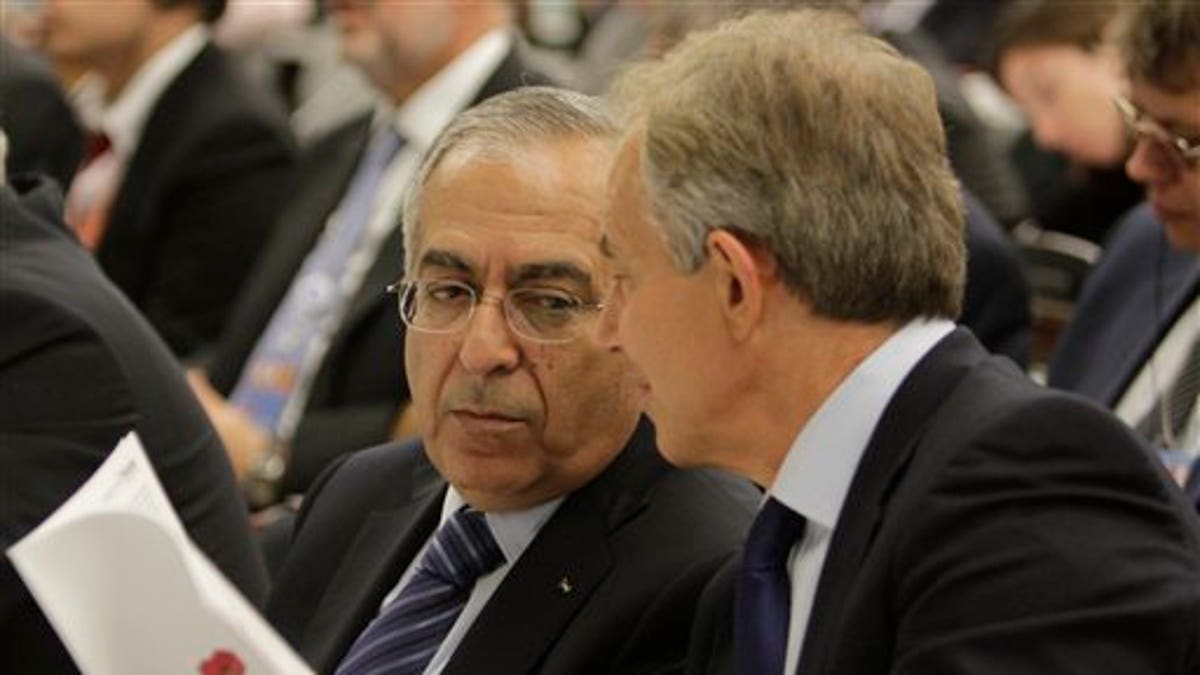
September 18: The Quartet Representative Tony Blair and Palestinian Prime Minister Salam Fayyad, participate in a meeting of the Ad Hoc Liaison Committee (AHLC), the donor support group for the Palestinians at United Nations headquarters. (AP)
Donor nations on Sunday reaffirmed the Palestinian Authority's readiness for statehood based on new reports from key international financial institutions and the United Nations.
The backing from the World Bank, the International Monetary Fund, the U.N. and the donors as world leaders started arriving for high-level meetings at the General Assembly should give a boost to the Palestinians as they press their bid for U.N. membership as an independent state.
Norway Foreign Minister Jonas Gahr Stoere, who chairs the donors support group, the Ad Hoc Liaison Committee, said at a meeting that efforts "to build robust state institutions and revive the Palestinian economy stand out as a remarkable international success story."
In April, the committee of major financial contributors to the Palestinians welcomed the assessment of the World Bank, IMF and U.N. that the Palestinian Authority "was above the threshold" for running state institutions.
"Today we have reconfirmed, based on the World Bank, the IMF and the United Nations that this progress is still solid," Stoere told reporters in summarizing the more than three-hour meeting Sunday night.
"It's now crucial to safeguard these achievements and the progress made so far," he said.
Stoere said the committee focused on maintaining the Palestinian Authority's "fiscal sustainability and economic viability."
In reports prepared for the meeting, the International Monetary Fund and the World Bank warned of increasing risks to the Palestinian economy that could undermine recent growth and achievements in building the institutions of a state.
The IMF reiterated its April assessment that the Palestinian Authority "is now able to conduct the sound economic policies expected of a future well-functioning Palestinian state, given its solid track record in reforms and institution-building in the public finance and financial areas."
But the IMF said economic growth in the West Bank declined from 8 percent in 2010 to 4 percent in the first half of 2011. It warned that declining aid to the Palestinians, especially from regional donors, has led to "a liquidity crisis" and said there is "an urgent need" for donors to fill a $300 million gap in the Palestinians' financial requirement of $1.1 billion this year.
The World Bank reported "substantial progress" in the Palestinians' two-year program to build strong state institutions. "However, the onset of an acute fiscal crisis, accompanied by declining economic growth, may undermine the promise of these institution-building achievements," it warned.
Stoere said the committee expressed concern that the effects of Israel's occupation of the West Bank and Gaza Strip were hampering the potential for economic growth, and that donor support for the Palestinians may be faltering at "a critical stage to maintain donor activity."
He said there was also a message from the meeting that donors want to see long-stalled negotiations between the Israelis and Palestinians resume.
Stoere said Palestinian Prime Minister Salam Fayyad told the committee that the Palestinian Authority "finds itself compelled to accelerate the pace of an already strong fiscal adjustment effort."
He said donors and the Israeli government should cooperate with the Palestinians to promote their transition to economic self-reliance by implementing a series of measures.
These include increasing revenue by widening the tax base and improving tax collection, including ensuring transparent revenue collection by Israel on behalf of the Palestinian Authority, and bolstering economic activity by further dismantling restrictions on economic activity in the West Bank, Stoere said.
Israel's Deputy Foreign Minister Danny Ayalon told the meeting that future Israeli economic assistance and cooperation, while essential for the Palestinian Authority to build up its institutions, "could be severely and irreparably compromised" if the Palestinians unilaterally declare a state.
Ayalon urged the donors to "do their best to turn the Palestinian leadership away from confrontational and provocative unilateral steps and lead them back to the negotiating table."
